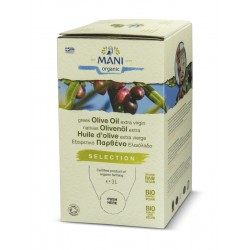Olive oil has become a staple in many kitchens. The Mediterranean “tree oil” pleases with its aroma, natural vitamins and lots of healthy unsaturated fatty acids. But how easy is olive oil to care for and what needs to be considered in terms of durability?
How long does olive oil keep?
Basically, the shelf life of olive oils is 18 to 24 months. At least that's what the manufacturer's sell-by date says. This applies to unopened oils. Opened oils, on the other hand, are in contact with oxygen and thus deteriorate much more quickly. Accordingly, opened olive oils should be consumed within a few months.
The shelf life of olive oil is primarily a question of storage. If you protect your oil sufficiently against light and heat, you can also use opened products over a longer period of time.
Good to know: The MANI polyphenol olive oil has a shelf life of 14 months when sealed and with consistent quality.

The shelf life of olive oil primarily depends on storage
How to store olive oil correctly
Olive oil is very durable, but needs to be treated accordingly. Opened and in the blazing sun on the window sill, it goes rancid in no time – and no longer smell good! Rancid olive oil is not harmful per se, but it is undrinkable. With the four tips, olive oil can easily be kept fresh for a longer period of time:
- Closed: Oxygen is the natural enemy of olive oil. It reacts with the ingredients and makes it go rancid faster. The bottle or canister should always be tightly sealed so that the oil comes into as little contact with oxygen as possible.
- Protected: Olives and olive trees love sun but the finished olive oil - not at all. If an olive oil is exposed to the sun too much and for too long, it loses its shelf life. It can then spoil within a few weeks. Olive oil feels most comfortable in a dark corner of the cupboard!
- Low temperature: Olive oil has a moderate temperament. At 10 to 20 °C it neither sweats nor starts to freeze and thus achieves the ideal durability.
- Vessel: never in a transparent container. The choice should rather be on a darkened, at best completely opaque vessel. Only then is the oil adequately protected against sunlight. Of course, it is also important that the packaging is health-friendly and does not release any substances into the oil. For this reason, MANI exclusively uses canisters, which are neither coated with lacquer nor contain BPA.
Tip: By the way, olive oil can also can be stored in the refrigerator or in the freezer. Although the comfortable temperature for the best shelf life begins at 10 °C, storing it in the refrigerator will only slightly affect the taste of the oil, but the quality will definitely be maintained. A sure thing, especially on hot summer days!

Olive trees like the sun but it is not conducive to the shelf life of olive oil
Can olive oil go bad?
In theory, olive oil can go bad, but not everything that looks bad is also necessarily bad. Especially when oil solidifies or separates, that's one of those things. Olive oil that has been preserved in the refrigerator often shows signs of flocculation. Many then immediately think that the oil is spoiled and must be disposed of but that is a wasteful mistake. Olive oil that flakes after being in the fridge is simply a sign that it has become too cold. After a while at normal room temperature, it will return to normal.
How do you tell if an olive oil is bad? Really undrinkable olive oil can be recognized by its smell. If it smells rancid, it should no longer be used. The same applies to permanent discoloration.
Conclusion
For the best possible shelf life, olive oil depends above all on the right storage. Perfect conditions offer closed, opaque containers, which are stored at room temperature protected from light. Especially quality olive oils usually come in a high-quality packaging and are protected from heat and light! This combination of proper storage and the choice of quality oils offers the best conditions for a long-lasting olive oil enjoyment!
By the way: olive oil, unlike wine, becomes milder in taste over time. Especially with high-quality oils, which often taste slightly bitter, storage can even refine the aroma.



















